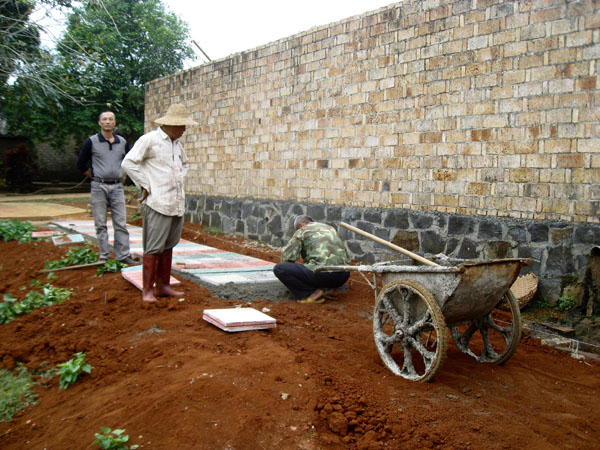Red culture tourism in Hainan
|
|
|
Villagers lay a sidewalk by hand in a village near Long Fa Mountain. The mountain was used as a cave by the Chinese army during the war. Hainan's government is providing money to local villages with historical importance to develop tourism and teach people about China's red culture. [Suzi Tart/China.org.cn] |
|
|
|
Hainan village life relies heavily on the natural environment. One popular way of relaxing is in a hammock made from a fishing net. Tourists can spend the night in a village to get a feel for local island life. [Suzi Tart/China.org.cn] |
With China having the second largest travel economy in the world, Hainan might be on to something. Although red culture might not interest foreigners, it is an easy way to develop its remote villages. Over the past few years, the Hainan government has been providing grants to various villages to lay sidewalks, build community facilities and provide recreational activities such as volleyball courts or paddleboats. For 50 RMB a night, tourists can stay with a local family to get a taste of the island's more quiet side of life. The money goes straight to the villagers, generating profit in non-coastal parts of the island. This kind of tourism also generates government support, something Jean-Claude Baumgarte, president and CEO of the World Travel and Tourism Council, says is important for sustaining the industry in the post-financial crisis era.
Governor Luo believes integrating Hainan's unique culture and resources is crucial for a thriving tourism sector. As cultural tourism creates little pollution, has high-added value and is capable of driving economic growth, it is seen as a win-win solution to develop both the high-end tourism that depends on the island's ecosystem and the social situation of the island's residents who must make a living during the off-season.
"We are witnessing a historical period in Chinese history, when culture is integrating into tourism," Cai remarked.
 0
0 




![Hainan village life relies heavily on the natural environment. One popular way of relaxing is in a hammock made from a fishing net. Tourists can spend the night in a village to get a feel for local island life. [Suzi Tart/China.org.cn] Hainan village life relies heavily on the natural environment. One popular way of relaxing is in a hammock made from a fishing net. Tourists can spend the night in a village to get a feel for local island life. [Suzi Tart/China.org.cn]](http://images.china.cn/attachement/jpg/site1007/20100322/000d87ad3cdd0d11199415.jpg)





Go to Forum >>0 Comments